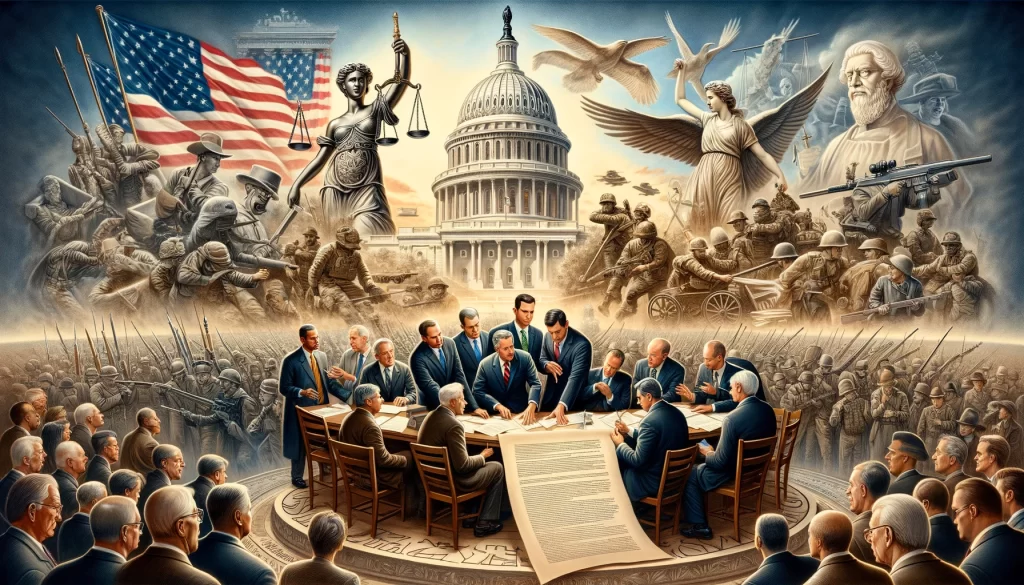A bipartisan group of legal experts have raised concerns about the power the President of the United States has to deploy troops on American soil. These experts are encouraging Congress to make changes to a set of laws called the Insurrection Act. They want to make sure that the President has limits on how troops can be used within the country. This is to prevent any future president from misusing this vast authority.
Elizabeth Goitein, who leads the Liberty & National Security Program at the Brennan Center for Justice, mentioned, “It’s really up to the president to decide when to use the armed forces as a domestic police force.” She finds this troubling because having the army operate internally could easily lead to misuse of power, turning into tyranny.
The Insurrection Act, established before the creation of state and local police forces as we know them today, allows the president to call upon the military during emergencies to handle unrest or rebellions in the country.
The last time this act was called into action was in 1992 by President George H.W. Bush to manage violence in Los Angeles following a controversial court verdict. However, the act is often remembered for its use by President Dwight Eisenhower to enforce school desegregation in Little Rock, Arkansas, marking a significant moment in civil rights history.
The Insurrection Act was considered again after Hurricane Katrina and before the events at the U.S. Capitol on January 6, 2021. Jamie Raskin, a Democrat and Maryland Representative, pointed out that Stewart Rhodes, who has been convicted of conspiring against the government, wanted former President Donald Trump to use the Insurrection Act to maintain power unlawfully. Rhodes’s idea was for Trump to call upon his group, the Oath Keepers, under the guise of the act. Trump did not do this, but the incident has served as a cautionary tale.
Raskin emphasized that the United States is not a military dictatorship and military force shouldn’t be used for regular law enforcement activities.

Jack Goldsmith, a law professor at Harvard and a leader of the Presidential Reform Project, believes that updating the Insurrection Act is a critical task that should transcend political affiliations. He proposed three significant changes to the law:
1. Clarify the language for the circumstances under which the president can invoke this power.
2. Mandate that the president consults with state officials and Congress before using the act.
3. Most importantly, establish a time limit for the use of military force, after which Congress must decide whether to continue or disband the deployment.
Senator Richard Blumenthal, a Democrat from Connecticut, is considering a proposal that would allow the president to deploy the military under the act for about a week before needing Congressional approval to continue.
Blumenthal hopes for bipartisan support for these changes, emphasizing the need for checks and balances on a power that, as it stands, is too open to abuse.
These discussions are happening against the backdrop of the current presidential campaign, with reports suggesting that former President Trump might consider using the Insurrection Act to address protests or crime if re-elected. Meanwhile, some Democrats have suggested President Biden use the act to federalize the National Guard along the Southwest border amidst disputes with Texas officials over state authority.
Advocates stressed that their call for updates to the Insurrection Act, a law dating back to the 1790s, reflects a desire to ensure it suits today’s conditions and prevents potential abuse of power.
This article is based on the following article:

Background Information
Understanding these concepts helps clarify why the Insurrection Act’s potential for misuse concerns legal experts and politicians across the political spectrum and why they are advocating for its reform. This ensures that the Act remains a tool for protecting citizens and upholding the law, rather than a means of political coercion or oppression.
The Insurrection Act
- What is it? The Insurrection Act is a set of laws in the United States that allows the President to deploy military and National Guard troops within the country to handle civil disorder, insurrection, and rebellion. It is a rare exception to the general principle that domestic law enforcement is a state responsibility, not a federal or military one.
- History: The Act was originally passed in 1807, making it one of the oldest laws concerning the deployment of troops within the U.S. Its use has been rare and typically in response to specific requests from states needing help to restore order or to enforce federal laws when local authorities are unwilling or unable to do so.
Presidential Powers
- Scope and Concerns: The President of the United States, as the Commander-in-Chief of the armed forces, has broad powers, but these are balanced by the Constitution and laws like the Insurrection Act. The concern raised by legal experts is that without clear limits, these powers could be abused to undermine democracy and civil liberties.
Historical Instances of the Insurrection Act’s Use
- 1992 Los Angeles Riots: After the acquittal of police officers videotaped beating Rodney King, widespread riots broke out. President George H.W. Bush invoked the Insurrection Act to restore order.
- Little Rock Integration (1957): President Dwight Eisenhower used the Act to send federal troops to Little Rock, Arkansas, to protect nine African American students integrating into a previously all-white school, showcasing the federal government’s commitment to civil rights.
- Civil Rights Movement: The Act was also used in the 1960s to enforce desegregation orders in the South, further emphasizing its role in civil rights history.
Concerns and Proposals for Change
- Abuse Potential: The Act’s broad language and the significant discretion it grants the President have raised fears that it could be misused for political ends, to suppress dissent, or to interfere in state affairs.
- Proposed Reforms: Suggestions include narrowing the conditions under which the Act can be invoked, requiring consultation with Congress and state authorities, and imposing time limits to ensure any deployment is temporary and subject to legislative oversight.
Broader Context
- Military vs. Civil Law Enforcement: In the U.S., there is a strong tradition of separating military and civil law enforcement roles, rooted in the desire to protect democratic freedoms and prevent the emergence of a military dictatorship.
- State vs. Federal Authority: The U.S. federal system gives states significant powers, including over local law enforcement. Federal intervention, especially through military means, raises sensitive issues about states’ rights and the balance of power.
- Civil Liberties: At the heart of the discussion is the protection of civil liberties—individual rights protected by law from governmental interference. The misuse of military power can threaten these liberties, making legal safeguards essential.

Debate/Essay Questions
- How might reforms to the Insurrection Act protect civil liberties while ensuring national security?
- In what situations, if any, is it justifiable for the President to bypass state authority and deploy the military within a state?
Please subscribe to Insight Fortnight, our biweekly newsletter!
